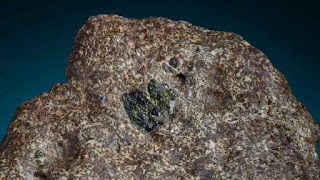Image courtesy of Maine Mineral and Gem Museum/Darryl Pitt,
fair use doctrine.
Joel Kontinen
Evolutionists believe that a lonely
meteorite that landed in the Sahara Desert in 2020 is older than Earth. The
primeval space rock is supposedly about 4.6 billion years old, and is the oldest known
example of magma from space.
The meteorite, called Erg Chech
002 (EC 002), is likely a rare surviving chunk of a lost baby planet that was
destroyed or absorbed by bigger rocky planets during our solar system's
formation.
Approximately 3,100 known
meteorites originated in crust and mantle layers of rocky asteroids, but
they reveal little about protoplanet diversity when our solar system was young.
About 95% come from just two parent bodies, and around 75% of those originated
from one source — possibly the asteroid 4 Vesta, one of the largest objects in
the asteroid belt, the researchers reported.
Here’s how the evolutionists claimed it: EC 002 stood out. Radioactive versions, or isotopes, of aluminum and magnesium indicated that the meteorite's parent was an ancient body dating to 4.566 billion years ago, and EC 002's chemical composition revealed that it emerged from a partly-melted magma reservoir in the parent body's crust.
This is just an example of Darwinian speculation.
Source
Weisberger Mindy. 2021. 4.6-billion-year-old meteorite belongs to Earth’s long-lost baby cousin Live Science 9 March.















